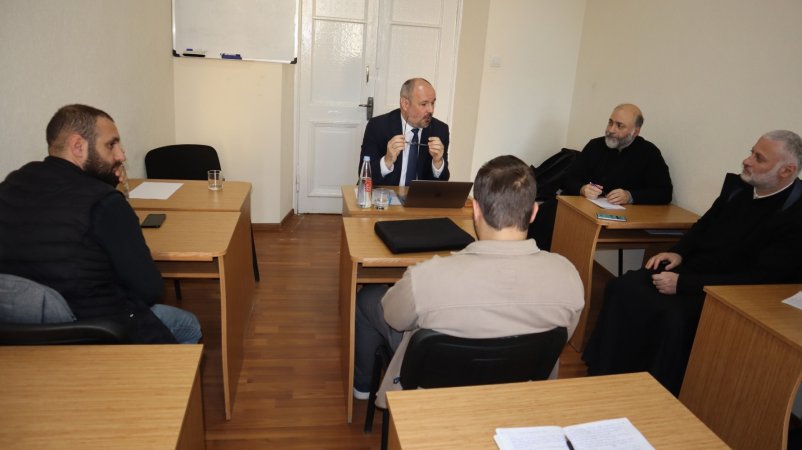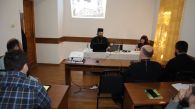On Thursday, November 9, the
guests from Poland held their final lectures at Tbilisi Theological
Academy and Seminary. The lectures were delivered within the
framework of the Erasmus + exchange program by the Professor of
Warsaw Academy of Christian Theology, Bishop Endrew (Borkowski) and
the Professor of Warsaw Academy of Christian Theology, Dean of the
Faculty of Theology Jerzy Ostapczuk.
The topic of Bishop Endrew’s
lecture was the Union as a problem of theological dialogue with the
Roman Catholic Church.
Initially, the speaker explained
that the word union means unification. This, indeed, is a
unification of Churches, which was introduced by the Roman Catholic
Church at the end of the 16th century, the goal of which was to
bring the Orthodox believers under its control from administrative
and legal points of view. It caused deep indignation in the Eastern
Churches, being a process of violation which continued until the
beginning of the 19th century. For this period, 90% of the
parishioners of the Uniate Church rejoined the Orthodox Church.
Today, however, two million Uniates live in the western part of
Poland.
The introduction of the Union
aggravated the relationship between the Polish Orthodox Church and
the Roman Catholic Church. This is also the problem of the Churches
of other neighboring countries. The Uniates follow the rules of the
Orthodox in terms of worship and apparel, but they have Catholic
dogmatics and legally obey the Roman Catholic Church.
In 1964, at the third
Pan-Orthodox Conference, held in Rhodes, the question of abolishing
the Union and reuniting its parishes with the Orthodox Church or
the Catholic Church (according to desire) was raised. The same
issue was discussed at the meeting held in Austria and Germany in
1990, which meant dialogue on theological issues.
At these meetings, the Union was
finally rejected and was called a medieval method of unification.
It has been officially declared that the Unitarian Church had
brought more division between the Orthodox Church and the Catholic
Church than unity. The Union was also condemned by the
representatives of the Roman Catholic Church, who signed an
agreement declaring that the Vatican was directly responsible for
the problem of the Union.
Finally, thas agreement was not
acceptable to the Pope and he attempted to neutralize it.
Publicizing of the agreement throughout the official Vatican
publications was banned. This turned out to be a serious obstacle
to sincere dialogue, and the Union remained a problem. However, it
can be considered a great contribution of the aforementioned
meetings that the representatives of the Orthodox Church and the
Roman Catholic Church agreed on the principle issue: the Union is
not a model of the unity of the Church.
Subsequently, the Polish Orthodox
Church determined to terminate the dialogue with the Vatican on the
problem of the Union, although it still supports the issue of its
abolition.
At the end of the lecture, the
speaker answered the students’ questions.
The topic of Jerzy Ostapchuk’s
lecture was the liturgical Gospels. He gave a survey of texts
incorporated in the Cyrillic and Greek liturgical printed Gospels,
more precisely - the short lives of the Evangelists, which in
Georgian are called Praise. Inclusion of the Praises of the
Evangelists in printed liturgical Gospels is found from the
mid-17th century. The speaker was interested in the identity of the
authors of those comments. One of the authors was a certain
Sophron; he investigated the question of Sophron’s identity and
established that he was a Greek disciple of the blessed Jerome, who
translated these short lives of the Evangelists from Latin into
Greek.
The lecture, according to
tradition, concluded his speech with a question-and-answer
session.






